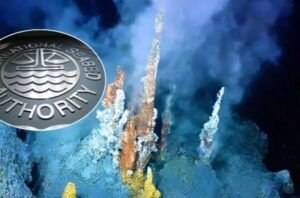
Why in News?
-
India has secured a first-of-its-kind licence from the International Seabed Authority (ISA) to explore polymetallic sulphides in the Carlsberg Ridge of the Indian Ocean (September 2025)
-
Makes India the first country to receive such exploration rights in this geologically significant zone
-
About Polymetallic Sulphides & India’s Licence
Introduction
-
Polymetallic sulphides are deep-sea mineral deposits rich in manganese, cobalt, nickel, and copper
-
These minerals are crucial for batteries, renewable energy, and high-tech manufacturing
-
The Carlsberg Ridge lies in the northwest Indian Ocean
-
Forms the boundary between the Indian and Arabian tectonic plates
-
India’s New Exploration Rights
-
Agreement signed in September 2025 with the Jamaica-based ISA
-
Grants India rights to explore 3,00,000 sq. km in the Carlsberg Ridge
-
First global licence for this region
-
Gives India a pioneering role in deep-sea exploration
-
Previous Exploration Efforts
-
2002
-
Rights in the Central Indian Ocean Basin for polymetallic nodules
-
-
2016
-
Rights for polymetallic sulphides along the Indian Ocean Ridge
-
-
Contracts valid till 2027 and 2031, respectively
-
Multiple surveys conducted
-
Large-scale exploitation remains limited due to cost and environmental concerns
-
Strategic Importance
-
Critical minerals support
-
Electric mobility
-
Renewable energy storage
-
Advanced electronics
-
-
Securing exploration rights strengthens India’s position in global supply chains
-
Counters Chinese presence in the region
-
Reports of Chinese vessels spurred India’s 2024 ISA application
-
-
Serves both economic and national security goals
Legal & Environmental Dimensions
-
Under UNCLOS
-
Countries can claim up to 350 nautical miles
-
In some areas like the Bay of Bengal, up to 500 nautical miles
-
Beyond this, resources fall under ISA jurisdiction
-
-
Deep-sea mining is controversial
-
May cause irreversible biodiversity loss
-
-
India must balance resource exploration with environmental commitments
Global Context & Future Outlook
-
Currently, 19 countries hold seabed exploration rights under ISA agreements
-
India’s Carlsberg Ridge licence is unique for its scale and location
-
Likely future investments include
-
Indigenous subsea technology
-
Robotics
-
Environmental impact assessments
-
-
Vital for India’s
-
Clean energy transition
-
Manufacturing competitiveness
-
Energy security
-




